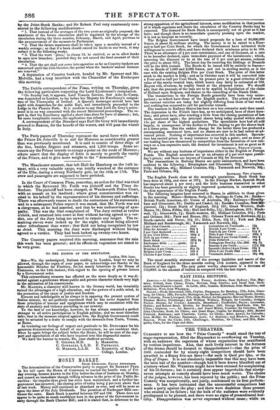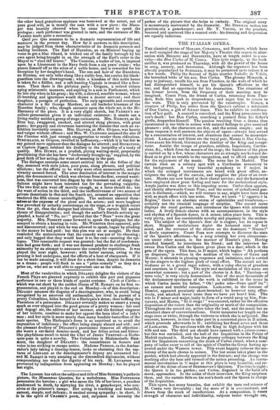THE THEATRES.
Curtrosrrv to see how the "Prize Comedy" would stand the test of stage-representation, filled the Haymarket to overflowing on Tuesday, with an audience the eagerness of whose expectation was manifested by restless impatience. Alas, that such lively interest in the fortunes of the drama should be doomed to disappointment !—that the prize of 500/. contended for by ninety-eight competitors should have been awarded to a flimsy five-act farce I—for such is Quid pro Quo, or the Day of Dupes. It is not absolutely impossible that this may have been the least bad of the number—though had it been drawn blindfold out of a lottery-wheel Mr. WEBSTER might have been excused for complaining of his ill-fortune ; but it certainly does appear improbable that ninety- seven attempts at comedy should have been much worse. The choice of the judges, however, has been rejected by the public ; and the Prize Comedy was unequivocally, and justly, condemned on its first perform- ance. It has been insinuated that the unsuccessful competitors bad made a party against the play ; and there were doubtless those present who exulted in its failure ; but the bulk of the audience were evidently predisposed to be pleased, and there were no signs of premeditated hos- tility. Disapprobation was nener expressed without cause ; while on the other hand gratuitous applause was bestowed at the outset, out of pure good-will, as is mostly the case with a new piece: the Mana- ger was heartily cheered when he came forward to speak the prologue ; each performer was greeted in turn, and the entrance of Mr. FARREN made quite a sensation.
Quid pro Quo assumes to be a dramatic representation of life and manners in the present day. How far it answers to this description, may be judged from these characteristics of its dramatis personm and leading incidents. The Earl of Hunsdon an ex-Minister buying up votes to get a blue riband, is tricked out of the family borough by his own agent being brought in on the strength of the Earl's order to the Mayor to " elect th; bearer." The Countess, a leader of ton, is imposed upon by a Lieutenant in the Navy fresh from a six years' cruise ; who passes himself off as the scion of a noble house, and is rewarded for his deception by her daughter's hand. The son and heir of the Hunsdons, an Etonian, not only talks slang like a stable-boy, but carries his black- guardism into the drawingroom ; while a kinsman of this noble house is taken for a fiddler, and a tuft-hunting Captain is treated like a foot- man. Then there is the plebeian party : Grigson, a retired citizen aping aristocratic manners, and aspiring to a seat in Parliament, which he lets slip when in his grasp ; his wife, a shrewd, sensible woman, whose ill-breeding and ignorance would shame a decent servant ; and their daughter, a paragon of perfection. The only agreeable and consistent character is a Sir George Mordent, an old bachelor kinsman of the Hunstion family ; who, though sarcastic upon the whole set, is the Mr. Harmony of the piece. It is a very slight sketch, but FARREN'S ex- cellent personation gives it an individual existence : it stands out a living reality amidst a group of stage caricatures. Mrs. NISBETT, as the Eton boy, swaggered, smoked, and uttered slang phrases, with great gusto ; her gayety and cleverness lessening the distaste that such an ex- hibition inevitably creates. Mrs. GLOVER, as Mrs. Grigson, was hearty and vulgar without offence ; and Mrs. W. CLIFFORD assumed the airs of the Countess with just enough exaggeration to render them ridiculous. STRICKLAND, as Grigson, revelled in buffoonery,—which it is but fair co say gained more applause than the dialogue he uttered; and BUCKsToNE, as Captain Sippet, subdued his drollery to the insipidity of a toady of quality. Mrs. Ilumnv, as a prudish, prying waiting-maid, perpetually proclaiming that she has been "deckerously brought up," supplied, by the good faith of her acting, the want of meaning in the part. The dialogue contains some smart satirical hits at the follies of the day, seasoned with stale jokes, poor puns, slang phrases, and political allusions ; but the efforts to be witty were often unsuccessful, and the vivacity seemed forced. The utter destitution of interest in the meagre plot, the denouement of which was obvious from the first, created weari- ness, that was converted into disgust by the incessant use of slang : the dulness might have been tolerated but for the pervading vulgarity. The two first acts went off merrily enough, as a farce should do; but the want of action in the third, and the ineffectiveness of two scenes of private theatricals in that and the fourth act, aroused an opposition that rendered the fifth almost unintelligible. The audience amused them- Selves-at the expense of the piece and the actors; and more laughter was provoked by unlucky contretemps on the stage, or a waggish retort from the pit, than the dialogue had elicited. The curtain fell amidst shouts of disapprobation ; and though the author's friends actively ap- plauded, a burst of "No, no !" proved that the " Noes " were the great majority. Mrs. Nrsnarr came forward to speak the epilogue, but she essayed to obtain a hearing in vain. Mr.WEBSTER then appeared, pale and disconcerted ; and when he was allowed to speak, began by alluding to the money he had paid : but this plea was set at nought. He then reminded the malecontents that the comedy was not of his choosing ; and only begged that they would hear it to the end—meaning the epi- logue. This reasonable request was granted: but the fiat of condemna- tion had gone forth ; and it was not deemed prudent to challenge fresh animosity by an attempt to announce the comedy for repetition. It was played the next night, however; with better success, owing to the pruning it had undergone, and the efforts of a host of clacqueurs. If it can be made amusing, it will draw for a short time, despite its demerits as a drama : people will flock to see a "prize comedy" as they do a prize ox, who are as well able to appreciate one as the other.



























 Previous page
Previous page